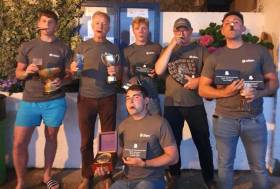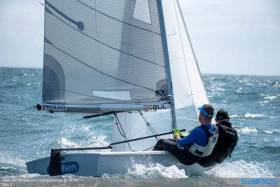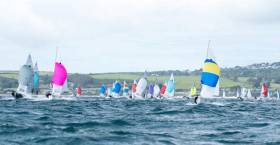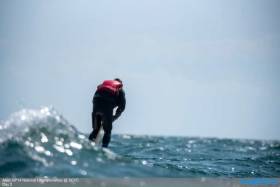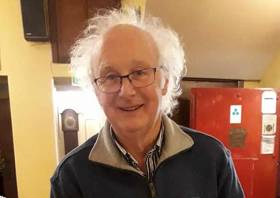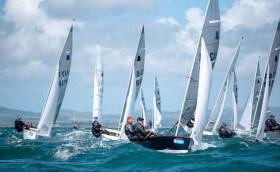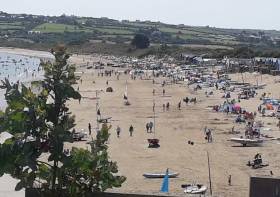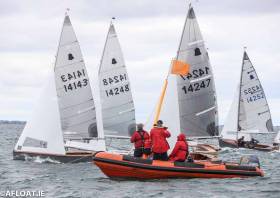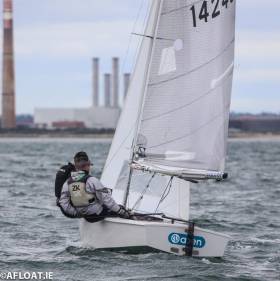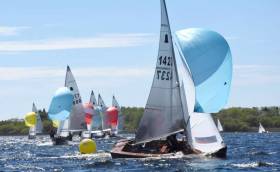Displaying items by tag: GP14
Sutton Dinghy Club took a haul of awards at last night's GP14 UK National Championships prizegiving in Abersoch including winners of the Club Trophy and with Peter and Stephen Boyle taking quite a few - seventh overall, Top Youth Helm, the Top Family trophy and first in Silver Fleet. Also, David Johnston and Collie Delaney were winners of the Bronze Fleet.
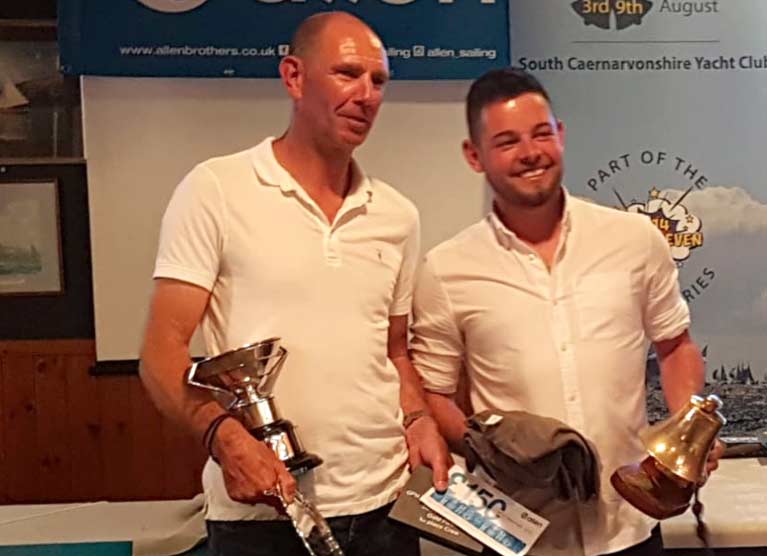 East Antrim Boat Club's Andy Thompson (left) and Sam Watson won the GP14 National Championship Trophy
East Antrim Boat Club's Andy Thompson (left) and Sam Watson won the GP14 National Championship Trophy
Sam Watson and East Antrim Boat Club's Andy Thompson won the GP14 National Championship Trophy. The winners also confirmed they will be across in a fortnight for the Championship of Ireland to be held in Skerries, the venue for 2020 World Championships. Ross Kearney who finished fourth will be back over to defend his crown won last year in Sligo.
Entry is now open for the 2020 Worlds with 25 confirmed entries already received.
While there was again an early start planned at the GP14 UK National Championships at Abersoch with the First Start Gun scheduled for 10:30, the wind had other ideas and the fleet was kept ashore. Racing cannot start unless there is a minimum of 6kts.
Report by Sutton Dinghy Club competitor David Johnston
Eventually, a bit of breeze filled in and the PRO called for a launch of the fleet. Ourselves and Club mates Peter Boyle started about 1/4 way down line from the committee boat, knock came so we tacked off to the right-hand side. We opted for pace rather than height and then another knock came at the layline so we tacked. We slightly overlayed it but Peter & Stephen got it spot on and rounded 4th, Mike Senior 5th with us in 6th. We had been 3rd at the weather mark in one race earlier in the week but got squeezed on to the mark and had to do turns. This was quite enjoyable. My new crew Collie in only his second event was a bit confused.
The first reach was very low, Jim Hunt got ahead of us, Mike Seniors boat speed was very good and got ahead of Peter, but no one else. There was a big gap between ourselves and next pack. Back upwind ourselves and Peter and Jim Hunt went back outright, looking good. Tacked back and saw Mike had taken the lead through shifts and boat handling. He was first around the weather before wind shut down and race canned.
Gutted but great to be up the front of the fleet for once this week after a few very very hard days at the office. I am sure our Club mates Peter & Stephen would have loved to get a finish and consolidate a top 10 spot. Weather looks iffy for tomorrow so it may all remain as is.
Boyles of Sutton Dinghy Club in Seventh at GP14 UK Nationals
After two second place finishes yesterday, Sam Watson and Andy Thompson are still holding first place overall at the GP14 UK Nationals in Abersoch North Wales writes Andy Johnson. Jim Hunt and Liz Senior are in second, however conditions today suited Mike Senior & Chris White, who had a tremendous day taking a second and two race wins.
There was another good day for young Peter Boyle from Sutton Dinghy Club of Dublin Bay as he competes at the top end of the UK GP14 fleet.
Racing featured a start rather than gate start and after a poor first beat, Boyle recovered well to get into the teens. A superb fifth in Race four and consistency in Race 5 & 6 see them consolidate their seventh place going into the last three races. Another SDC crew Hugh Gill & young Joe Doherty had good first race finishing with an 11 and got great position at the pin end for a line start and despite not having a watch onboard found themselves in top two around weather mark and and sailed well to take 10th which meant they had honour of being pathfinder for gate start in last race of the day. As pathfinder, there was no shift to provide any great advantage but Hugh and Joe managed to get home in 17th and jump up to 22nd overall.
Speaking with Stephen Boyle, Peter's father and crew earlier evening he gave a short update on their day.
"With racing blown out yesterday, today was an early start at 10:30 and 3 races on the cards. The Race Officer set the course down towards Pwllheli end of the bay, with wind force 5 ish blowing directly from Abersoch and tide due to change from flood to ebb at 1300 the beats saw a regular shift pattern with right-hand side towards the land zone of compression slightly favoured and more shifty throughout the day. Race 1 gate start got a good start first 1/3 of the gate and hammered up left-hand side, took a few shifts to work right but those boats who worked right early towards the land were favoured with Mike Senior taking the lead at the weather mark, we were third. Triangle sausage triangle was the course but the RO finished it after the sausage. We clocked a 5th and fairly happy with speed and boat handling.
Race2 we got caught out a little as the RO opted for triangle sausage triangle with a line start for a bit of variety but recovered well to get into the teens.
Port and towards the sea favoured and Hugh Gill took the pin after some jockeying, despite not having the time which was gratefully overheard from a neighbouring boat. They worked left initially and then took a shift to work back right towards the beach arriving first at weather mark to Mike Senior in second. They slipped back a bit on the corners due to slicker boat handling by more practiced crews but finished a very creditable 10th.
Race 3 it was back to gates with the tide now in full ebb the tactical decision was left for tide or right for shifts and more breeze in confession zone by the land. We opted to start first 1/3 in the gate and got a cracker with Sam Watson immediately to weather. After a few minutes, they couldn't live with us and tacked to port but were happy to see Mike Senior and pathfinder Hugh Gill still with reach. We went far left for the tide two tacking it and raced in on port layline with John Hayes one boat length ahead and to leeward. The boats that went right hooked into shifts and boat sides arrived simultaneously with Hayes opting to try his luck at weather mark inside three lengths only to suffer turns. We bailed out opting to duck but the tiller wrapped on the horse saw us charge downwind on port at onrushing starboard tack parade moving from 3rd to late teens in less than a minute. Three triangles and good speed on the beats pulled us back to 13th by the finish.
Overall a great day's sport saw the fleet in good form enjoying the post-race beers on a sunny beach in Abersoch"
Results here
GP14 UK Nationals at Abersoch Postponed
Racing today at the GP14 UK National Championships at Abersoch in North Wales has been postponed due to strong winds.
Southwest winds are gusting to over 35 knots at the South Caernarvonshire Yacht Club venue.
Races 4,5 and 6 for the 56-boat fleet are rescheduled for tomorrow, Wednesday 7th August.
Curly Morris Elected International GP14 President
Curly Morris of East Antrim Boat Club in Larne has been elected as President of the International GP14 Class.
The Class AGM held in Abersoch last night voted for the GP14 Ireland stalwart during its 2019 national championships, a year that also saw a special birthday celebration regatta to mark Curly's 75th at Skerries.
Over the years, Olympian Curly Morris has given international service as a member of World Sailing’s Classes Committee, thanks to his direct and beneficial experience of the exceptionally lively GP 14 National Association here.
Sutton Father & Son GP14 Pair Enjoy Heavy Airs at Abersoch
Sutton Dinghy Club father and son pairing Peter and Stephen Boyle had a very good second day at the GP14 UK National Championships in Abersoch to be top Irish boat in 14th place writes Andrew Johnston.
The Boyles had just competed at the RS400 Europeans in Lake Garda last week. While their first time racing an RS didn't go so great, the time on the water together seems to have paid off today in the 56-boat fleet.
Speaking to Stephen last night, the duo had been looking forward to the increased 20kt+ breeze forecast for Monday after the lite stuff on Sunday.
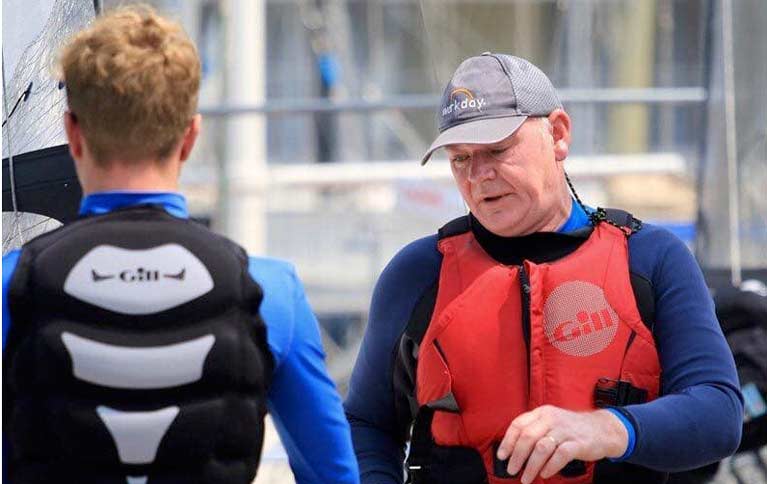 Stephen Boyle
Stephen Boyle
'We had had good clean starts and blasted left up first beats. Sam Watson & Andy Thompson were the pathfinder in the first race. They had to go right and fortunately got a header just as they were released. They were about 10 boat lengths clear of us at the weather mark and we had probably another 10 to the chasing fleet. Held 2nd for triangle and sausage until we had a slow hoist on 2nd triangle allowed chasing pack to close in. Finished 4th. Sam and Andy won by a good distance. Second race same plan we went hard left up the beat. Third to the weather mark. Course was 3 triangles. At the second weather mark and subsequent weather marks, we lost a few due to a problem with the spinny halyard, dropping us back to ninth. Overall happy with boatspeed in the heavy weather. 6 races to go. Bring it on.'
Full results here
Ten Irish GP14s Contesting UK Nationals in Abersoch
The GP14 UK Nationals kicked off yesterday with a practice race and the first of 9 races at South Caernarvonshire Yacht Club in Abersoch, North Wales writes Andrew Johnston.
With 10 Irish crews in the 56-boat fleet, hopes are high for some good finishes.
Light to medium winds made for a challenging day for everybody. With tide a factor, it was also not clear which side was going to be favoured. Best of the Irish was Newtownards Josh Porter and Sara Goudy with 13th having been in top 5 for much of the race. Colman Grimes/Tom Fox were 18th with Keith Louden & Alan Thompson in 21st.
World Champion and favourite Mike Senior also found it difficult finishing in 26th. Budworth's Russ Cormack leads into day two with 2018 Championship of Ireland winner Ross Kearney in 3rd.
With 8 more races to go, the Irish contingent is only warming up.
Other Irish places are 24th Bill Johnson (Lough Foyle YC), 31st Hugh Gill/Joe Doherty (Sutton Dinghy Club), 33rd John, /Donal McGuinness (Moville Boat Club), 34th James Peter Hockley / Owen Mc Cauley (Lough Foyle), 36th Peter Boyle & Stephen Boyle (Sutton Dinghy Club), 37th David Johnston D/Collie Delaney (Sutton Dinghy Club) and 47th Jack Buttimer /Matthew Street (Youghal Sailing Club)
GP14 Pair Stretch Lead at Volvo Dun Laoghaire Regatta
There was another race win for Sam Watson and Andy Thompson in The GP14 Leinster Championships being staged as part of Volvo Dun Laoghaire Regatta.
The result puts the lead pairing 13-points clear of Donegal's John and Donal McGuinness after six races sailed in the 31–boat fleet.
As Afloat reported yesterday here, this Nantwich and East Antrim pairing were tipped for GP14 Worlds glory in 2016, only to see Andy’s regular helm, Shane MacCarthy, take the title back to Greystones.
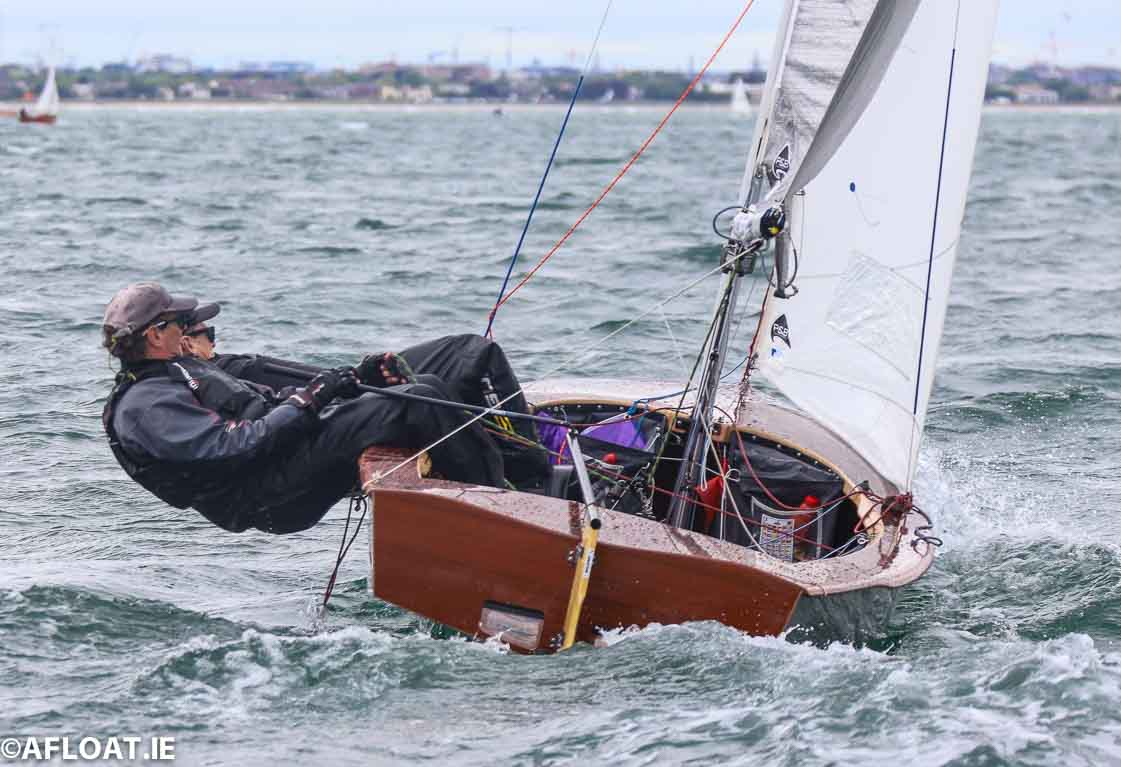 John and Donal McGuinness
John and Donal McGuinness
The final races are being sailed tomorrow.
In a year of dream team reunions - think Spice Girls and Westlife - the one featuring Sam Watson and Andy Thompson is perhaps best placed to reach new heights this weekend.
The Nantwich and East Antrim pairing were tipped for GP14 Worlds glory in 2016, only to see Andy’s regular helm, Shane MacCarthy, take the title back to Greystones.
Watson, who finished second at the Irish Nationals in Sligo last year, now looks intent on showing what the duo can really do at the Volvo Dun Laoghaire Regatta.
With the GP14 Leinster title also at stake, a first, second and third place has left them at the top of the fleet, which at 32 boats is the biggest dinghy class racing on Dublin Bay.
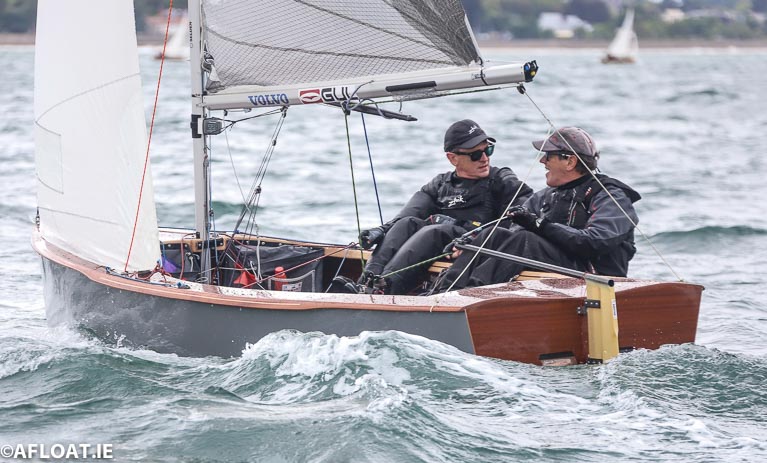 Donal McGuinness (left) keeps an eye on the fleet for brother John shortly after a GP14 start on Friday. The McGuinness pairing, from Moville Boat Club in County Donegal, lie second overall
Donal McGuinness (left) keeps an eye on the fleet for brother John shortly after a GP14 start on Friday. The McGuinness pairing, from Moville Boat Club in County Donegal, lie second overall
Former National champion John McGuinness, sailing with his brother Donal, pictured together above, sits four points adrift in second place, while Royal St George duo Dan O’Connell and Melanie Morris have plenty of breathing space in third.
Class newbie Alex Barry, whose early successes this year point towards an interesting trajectory towards the Worlds in Skerries next year, currently lies in 11th place with his former All Ireland Champions crew Richard Leonard.
Cullaun Sailing Club, Co Clare, hosted the Irish GP14 fleet for what turned out to be the 1st event of the year following the postponement of the Mullingar event in April.
Competitors travelled from the 4 corners of Ireland with visitors from Derry, Dublin, Cork and North Down and many points in between and were
warmly welcomed to the brand new clubhouse which had only been completed two weeks previously.
The race officer had a challenging weekend with light very shifty conditions on the Saturday and windier but still shifty conditions on the Sunday. He did a great job to get in 6 races over the 2 days and gave the class plenty of starting practice!
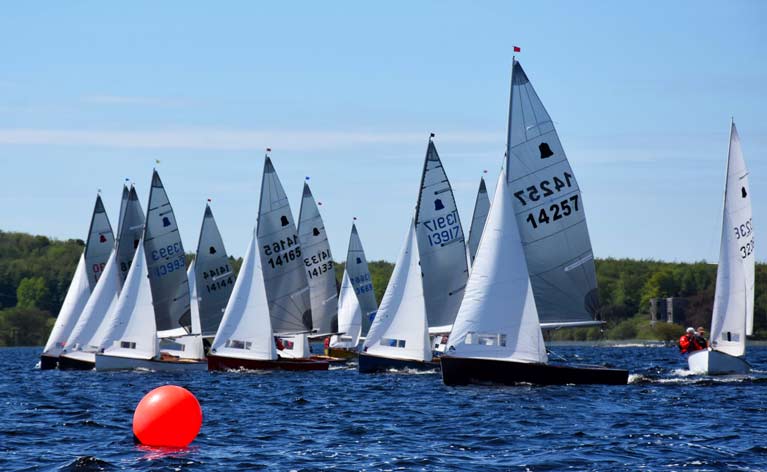 A start at Cullaun Photo: Rachel Thunder
A start at Cullaun Photo: Rachel Thunder
Race 1 was dominated by Colman Grimes and Matthew Street who built up a considerable lead of almost a leg at one stage but JP and Carolyn McCaldin got very lucky and hooked up with a gust on the final run and then took advantage of a 20-degree lift at the leeward mark to pinch 1st place. 3rd place went to class newcomers Alex Barry and Richard Leonard from Cork in their 1st competitive outing in the GP.
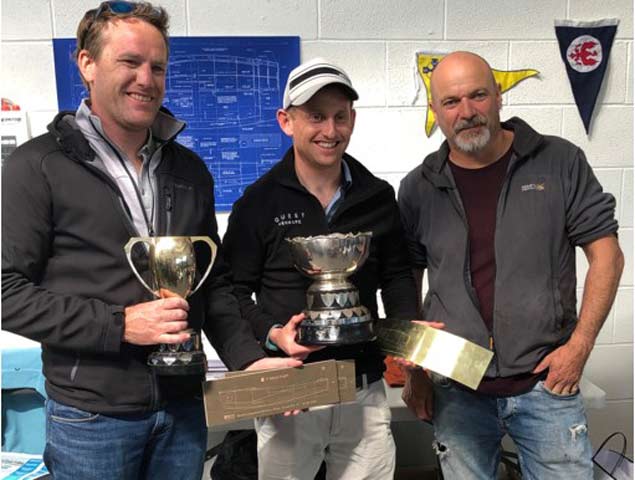 Alex Barry (centre) and Richard Leonard (left) are GP14 Munster and Purcell Trophy Champions
Alex Barry (centre) and Richard Leonard (left) are GP14 Munster and Purcell Trophy Champions
1st Silver fleet boat was Lawrence Baalham and Robbie Richardson with a 5th place and 1st bronze went to Michael Collender and Brian
Walker.
Race 2 followed a similar pattern with big shifts and multiple place changes. The McCaldins decided to start before the gun and had to go back! Keith Louden and Alan Thompson had a great battle with Alex and Richard to take the win. Lawrence and Robbie had another great result with a 3rd place with Norman and Ken Lee taking 4th. Michael and Brian were again 1st bronze.
Race 3 again saw lots of place changes with big gains (and losses!) to be made in the shifts. Alex and Richard won the race showing us all that they are definitely going to be a force to be reckoned with as the class builds to the worlds in Skerries in 2020. The Derry boys, James Peter Hockley and Owen McCauley taking 2nd place and 1st silver with Keith and Alan 3rd. 2nd silver was son and father team Conor and Barry Twohig. Again Michael and Brian were 1st bronze home.
Alex and Richard's consistency gave them a 4 point overnight lead from Keith and Alan with the McCaldins 2 points further back.
All competitors enjoyed an evening of BBQ and music in the local pub in Tulla and were treated to the skills of pool shark Hugh Gill beating all comers!
Sunday dawned with more wind, hiking would be required. Conditions still shifty, but thankfully not quite as extreme as day one.
Race 4 was led from start to finish by silver fleets Adrian Lee and Edward Coyne, giving them their first ever event race win. The McCaldins applied pressure at times but were unable to get past and took 2nd. Alex and Richard were 3rd with James Peter and Owen 4th and 1st silver. The theme continued with Michael and Brian again dominating the bronze fleet. Four races in, 4 different winners – showing how competitive the fleet is.
Race 5 was won by the McCaldins putting them on equal points with Alex & Richard going into the last race. Josh Porter and Andy Corkhill had a fabulous race to take 2nd at a photo finish with Keith and Alan 3rd. James Peter and Owen took 4th and 1st in the silver fleet - with this form they won’t be in the silver fleet long!! Richard decided to test the buoyancy of the spinnaker pole and his helms swimming ability was noted in this race! No prizes for guessing the 1st bronze boat!
The final race of the event was underway at the 5th or 6th attempt after numerous ‘U’ flag general recalls. With the wind in a left phase Alex and
Richard started at the pin end and crossed the fleet to lead from the McCaldins at the weather mark, with James Peter and Owen in 3rd. James Peter and Owen took a flier to the right on the 2nd beat to lead considerably at the windward mark followed by Alex and Richard. The Derry boys headed right again on the final beat followed by the McCaldins but this time left paid and Alex and Richard led comfortably at the final weather mark which they held to the finish to take the race and the event. James Peter and Owen were 2nd in the final race, 4th overall and 1st silver.
Event organiser Des McMahon and Pat Biesty stopped a clean sweep in the bronze fleet which was dominated by Michael and Brian.
Overall a great event, many thanks to everyone at Cullaun Sailing Club for their hospitality and effort.
The next event, the Ulster Championships, is hosted by Lough Foyle Yacht Club on 8th & 9th June. Rumour has it the fleet will be joined by some English raiders.


























